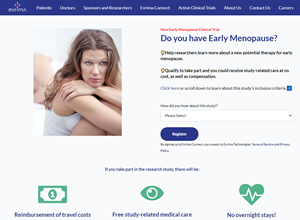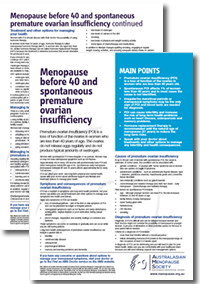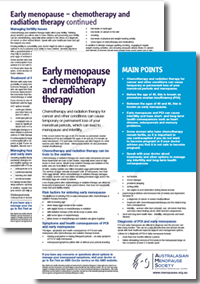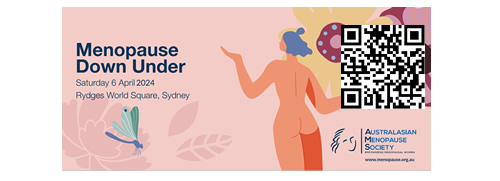The following topics concern early menopause:
AMS Information Sheets - for health professionals | Early Menopause: Health Practitioners’ Perspectives digital resource (Healthtalk Australia) | Clinical Trials | Patient Resources
Spontaneous Premature Ovarian Insufficiency
Menopause in women younger than 40 years of age is called premature menopause. If this happens spontaneously it is called premature ovarian failure. Premature ovarian failure affects about 1 in a 100 women. Around 8 per 100 women have premature menopause due to other causes such as chemotherapy or surgery. Menopause occurring between 40-45 years of age is called early menopause, affecting approximately 5% of women. Menopause can occur spontaneously or can be a result of chemotherapy (See AMS information sheet:- Early Menopause Due to Chemotherapy) or ovarian surgery. There is no evidence that early menopause is brought on by the use of oral contraceptives, fertility drugs or artificial hormones in the environment. However, smoking or a family history of early menopause is associated with an earlier onset of menopause. Diagnosis of early ovarian failure often has long term physical and psychological consequences, so women may need emotional support and ongoing medical follow-up.
![]() AMS Spontaneous Premature Ovarian Insufficiency470.86 KB
AMS Spontaneous Premature Ovarian Insufficiency470.86 KB
Early Menopause due to Chemotherapy and Radiotherapy
Chemotherapy is usually administered as part of cancer treatment but may also be given to women with severe connective tissue disorders such as systemic lupus erythematosis or kidney disease such as Wegener’s granulomatosis. Survival rates for many cancers in women of reproductive age are increasing. However, many treatments used to combat the disease carry a substantial risk for future infertility. Chemotherapy is toxic to the ovaries causing loss of eggs and destruction of the supporting ovarian tissue. This may cause temporary cessation of menstrual periods or early menopause which can develop quickly or gradually.
![]() AMS Early Menopause due to Chemotherapy and Radiotherapy537.99 KB
AMS Early Menopause due to Chemotherapy and Radiotherapy537.99 KB
Surgical Menopause
Menopause means the final menstrual period. The average age of menopause is around 51 years, but most women will start to notice menopausal symptoms from around 47 years. This may be noticed as the onset of hot flushes, night sweats or vaginal dryness or a change in menstrual periods to more infrequent and sometimes heavier menstrual bleeding (1). Removal of both ovaries (bilateral oophorectomy) before the normal menopause is called “surgical menopause”.
![]() AMS Surgical Menopause464.47 KB
AMS Surgical Menopause464.47 KB
These Information Sheets may contain copyright or otherwise protected material. Reproduction of this Information Sheet by Australasian Menopause Society Members and other health professionals for clinical practice is permissible. Any other use of this information (hardcopy and electronic versions) must be agreed to and approved by the Australasian Menopause Society.
A digital resource for health professionals caring for women with POI and early menopause
The Early Menopause: Health Practitioners’ Perspectives digital resource (Healthtalk Australia) is a unique resource aimed at supporting and informing health professionals from a range of specialties who work with women with POI and early menopause.
On this resource you can read, watch and listen to the experiences and perspectives of 16 health practitioners who provide medical care and psychological support for women diagnosed with spontaneous and medically-induced early menopause / POI, or menopausal symptoms as a result of cancer or other medical treatments. Health practitioners interviewed include breast care nurses, breast surgeons, clinical psychologists, endocrinologists, fertility specialists, general practitioners, obstetrician-gynaecologists, oncologists, and psychiatrists.
You will also find links to a comprehensive range of resources, including diagnostic and management (treatment) algorithms for early menopause, and links to a companion digital resource on women’s experiences for patients.
The online resource was developed as a result of a NHMRC Partnership Project involving academic endocrinologists and obstetrician-gynaecologists at the Monash Centre for Health Research and Implementation and the University of Melbourne and health sociologists at RMIT University. Partner organisations included AMS, National Breast Cancer Foundation, Healthdirect Australia, Women’s Health Victoria, Breast Cancer Network Australia, Monash Health, Endocrine Society of Australia, and Healthtalk Australia.
Clinical Trials
Early Menopause Medical Study
For more information and how to register go to:
Early Menopause Medical Study
https://trials.evrima.com.au/early-menopause-medical-study

Patient Resources
Fact Sheets
Menopause before 40 and spontaneous premature ovarian insufficiency

Early menopause – chemotherapy and radiation therapy


Note: Medical and scientific information provided and endorsed by the Australasian Menopause Society might not be relevant to a particular person's circumstances and should always be discussed with that person's own healthcare provider.
Page updated October 2022






